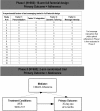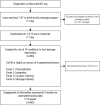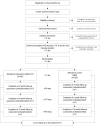Optimising text messaging to improve adherence to web-based smoking cessation treatment: a randomised control trial protocol
- PMID: 27029775
- PMCID: PMC4823397
- DOI: 10.1136/bmjopen-2015-010687
Optimising text messaging to improve adherence to web-based smoking cessation treatment: a randomised control trial protocol
Abstract
Introduction: Millions of smokers use the Internet for smoking cessation assistance each year; however, most smokers engage minimally with even the best designed websites. The ubiquity of mobile devices and their effectiveness in promoting adherence in other areas of health behaviour change make them a promising tool to address adherence in Internet smoking cessation interventions. Text messaging is used by most adults, and messages can proactively encourage use of a web-based intervention. Text messaging can also be integrated with an Internet intervention to facilitate the use of core Internet intervention components.
Methods and analysis: We identified four aspects of a text message intervention that may enhance its effectiveness in promoting adherence to a web-based smoking cessation programme: personalisation, integration, dynamic tailoring and message intensity. Phase I will use a two-level full factorial design to test the impact of these four experimental features on adherence to a web-based intervention. The primary outcome is a composite metric of adherence that incorporates general utilisation metrics (eg, logins, page views) and specific feature utilisation shown to predict abstinence. Participants will be N=860 adult smokers who register on an established Internet cessation programme and enrol in its text message programme. Phase II will be a two-arm randomised trial to compare the efficacy of the web-based cessation programme alone and in conjunction with the optimised text messaging intervention on 30-day point prevalence abstinence at 9 months. Phase II participants will be N=600 adult smokers who register to use an established Internet cessation programme and enrol in text messaging. Secondary analyses will explore whether adherence mediates the effect of treatment condition on outcome.
Ethics and dissemination: This protocol was approved by Chesapeake IRB. We will disseminate study results through peer-reviewed manuscripts and conference presentations related to the methods and design, outcomes and exploratory analyses.
Trial registration number: NCT02585206.
Keywords: Internet; adherence; smoking cessation; text messaging.
Published by the BMJ Publishing Group Limited. For permission to use (where not already granted under a licence) please go to http://www.bmj.com/company/products-services/rights-and-licensing/
Figures
References
-
- U.S. Department of Health and Human Services. The Health Consequences of Smoking—50 Years of Progress: a report of the surgeon general. Atlanta, GA: U.S. Department of Health and Human Services, Centers for Disease Control and Prevention, National Center for Chronic Disease Prevention and Health Promotion, Office on Smoking and Health, 2014.
-
- Fox S. Peer-to-peer healthcare. 2011. http://pewinternet.org/Reports/2011/P2PHealthcare.aspx. http://www.webcitation.org/69cRxwJlK
-
- North American Quitline Consortium. Web-Based Services in the U.S. and Canada 2014. http://www.webcitation.org/6VmCxFNsj
-
- Alere Wellbeing Inc. American Cancer Society Quit For Life Program 2014. Archived at http://www.webcitation.org/6VmBNqJAr
Publication types
MeSH terms
Associated data
Grants and funding
LinkOut - more resources
Full Text Sources
Other Literature Sources
Medical



